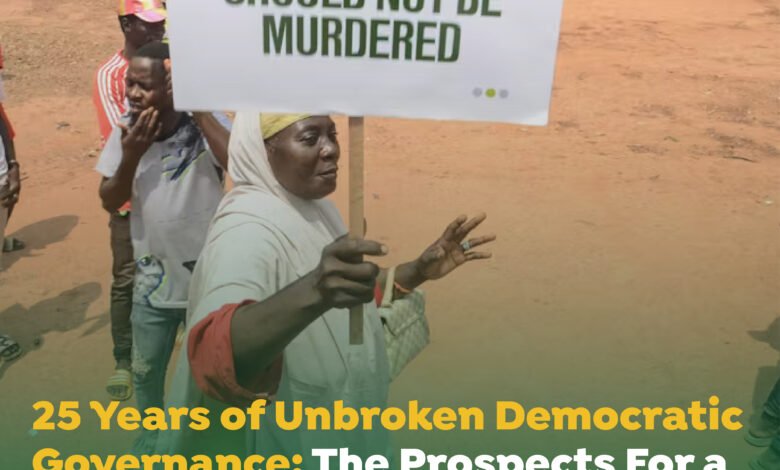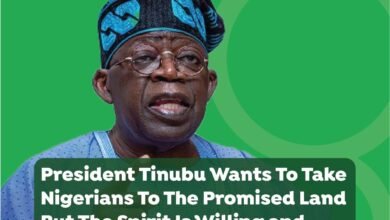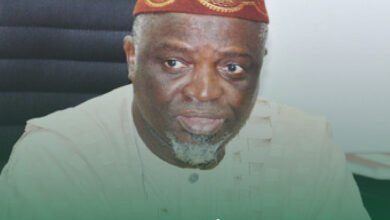
Nigeria’s longest democratic streak since independence has reached a significant milestone: the Silver Jubilee. For the past 25 years, the country has enjoyed a peaceful handing over and seamless transfer of power from one party to another, highlighting the unflinching commitment of critical stakeholders to upholding democratic principles.
This commitment was tested in recent times, with separatist movements in the South-East and rising insecurity in the North-East posing challenges to national unity. However, the democratic structures held firm, with the government engaging in dialogue alongside military efforts.
Challenges and Evolving Opinions
While the country has consolidated its democratic gains with periodic elections, opinions among Nigerians over the events of the past 25 years are varied.
Some point to persistent economic hardship and social inequality as evidence that democracy has not delivered its promises.
Others highlight the fact that freedom of speech and assembly are now enshrined, allowing for open criticism of the government.
Analysts contend that the worst of democracy is better than the best of military rule, noting that the system of government is a work in progress. “Democracy is never done,” Bayo Alabi, a public commentator asserted, “even in America, Democracy continues to evolve with the change of time.”
In a similar vein, scholars also contended that the events of the past 25 years cannot be properly contextualised without acknowledging the struggles for democracy that followed General Ibrahim Babangida’s annulment of the June 12, 1993 Presidential election widely believed to have been won by Chief MKO Abiola.
While it was Babangida who cancelled Nigeria’s most credible election, it was General Sani Abacha who ruthlessly stifled dissent.
He ruled with an iron fist, jailing Nigerians who dared to challenge his dictatorship. But General Abacha did more than make pro-democracy activists’ lives unbearable; he killed some while incarcerating others for no other offense than demanding a return to civilian rule.
MKO Abiola’s Legacy and the 1993 Election
Long before former President Muhammadu Buhari recognised the significance of June 12 to Nigeria’s democratic journey in 2018, governors in the South West geopolitical zone, where Chief MKO Abiola hailed from, had always ensured a public holiday to reflect on the gains and pains of 1993. But the recognition of the day by former President Buhari deservedly gave it a national appeal.
Given that Chief Abiola ran under a Muslim-Muslim ticket, an arrangement previously deemed politically risky in a religiously diverse country, Abiola prevailed regardless, underscoring the willingness of Nigerians to look beyond ethnic and religious affiliations and prioritize competence and character. However, in the struggle to reclaim his mandate, Abiola, his wife Kudirat, and a host of others paid the ultimate price for preserving the democracy whose fruits Nigerians now enjoyed.
Return of Democracy and Looking Ahead
The sudden death of General Abacha in 1998 marked a turning point for Nigeria’s quest towards democratic governance. General Abdulsalami Abubakar’s decision to return the country to civilian rule was met with cautious optimism.
Olusegun Obasanjo, a former military head of state and Abacha’s prisoner, became the newly elected President in 1999. However, his administration wasn’t devoid of criticisms, raising concerns about accountability within the democratic system.
Despite these challenges, Nigerians have witnessed a transfer of power between political parties, including the historic 2015 defeat of an incumbent president by an opposition candidate.
President Bola Ahmed Tinubu’s victory in the 2023 polls, coming from his background as a former Lagos state governor known for his focus on infrastructural development, reflects the electorate’s desire for progress.
Tinubu, himself an advocate for the recognition of June 12th as Democracy Day, represents a new generation of leaders tasked with addressing the economic and social issues that remain.
For many, the next 25 years of Nigerian democracy must focus on improving the lives of ordinary Nigerians.
This means tackling corruption, creating jobs, and investing in education and healthcare among other things. It also requires strengthening democratic institutions and ensuring inclusivity, so that all Nigerians feel they have a stake in the country’s future.





